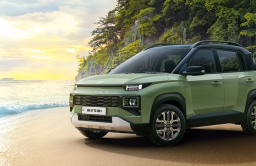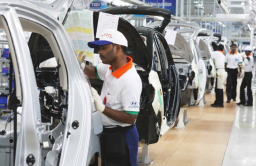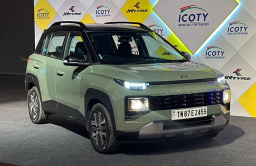-
KOSPI 2577.27 -2.21 -0.09%
-
KOSDAQ 722.52 -7.07 -0.97%
-
KOSPI200 341.49 +0.02 +0.01%
-
USD/KRW 1396 -2.00 0.14%
Hyundai-Kia’s India-only EVs to run on Exide batteries
Electric vehicles
Hyundai-Kia’s India-only EVs to run on Exide batteries
Hyundai Motor and Kia will team up with India’s battery maker Exide to develop LFP batteries for their first India-dedicated EVs
By
Apr 08, 2024 (Gmt+09:00)
4
Min read
News+
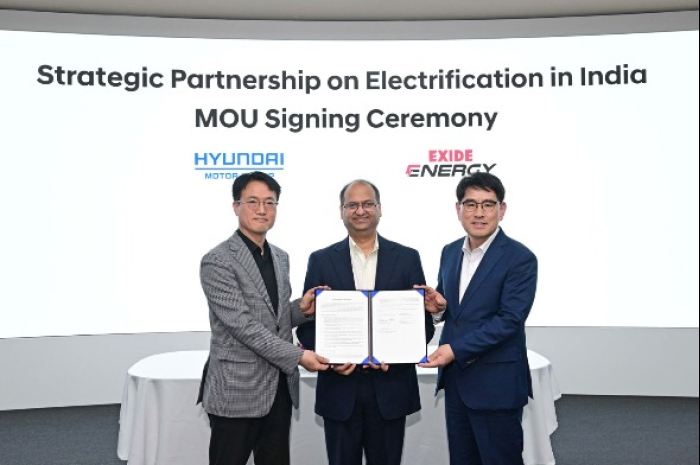
Hyundai Motor Co. and Kia Corp. will use lithium-ion phosphate (LFP) batteries that will be mass-produced by Indian battery maker Exide Energy Solutions Ltd. to power their first India-dedicated electric vehicles to grab the lead in the South Asian country’s fledgling EV market with high growth potential.
South Korea’s two largest automakers on Monday signed a memorandum of understanding with India’s Exide Energy, an EV battery subsidiary of Exide Industries Ltd., to jointly develop EV battery cells in India and cooperate on overall electrification technologies.
Under the agreement, the Indian battery maker will develop LFP batteries and deliver them to Hyundai Motor's and Kia’s car plants in India to fit them to the car makers' EVs to be exclusively developed for Indian drivers.
Exide Energy was set up in 2022 by Exide Industries, India’s No. 1 lead-acid battery maker with a 75-year history, to develop EV batteries. It plans to mass-produce EV battery cells later this year.
Hyundai Motor and Kia have forged a partnership with Exide Energy to ensure the successful launch of their first India-only EVs.
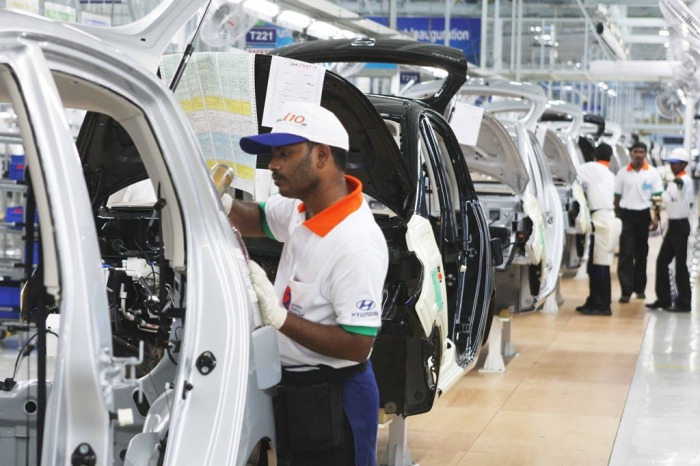
As batteries make up about 40% of the total EV production costs, locally made batteries are expected to significantly save EV manufacturing costs and lower overall EV prices in the South Asian country.
“As India is one of the promising markets for vehicle electrification, it is important to localize battery technology early in the country to ensure cost competitiveness,” Yang Hee-won, head of Hyundai Motor and Kia R&D, said after the signing ceremony on Monday. “I am looking forward to our first commercially available India-only EVs powered by batteries developed by an Indian company.”
To ensure the quality of batteries, Hyundai Motor and Kia will take part in the entire development and production process of Exide Energy’s EV batteries.
PREEMPTIVE MOVE TO LEAD A KEY FUTURE EV MARKET
Under the agreement, the two Korean carmakers are also considering later applying Exide's batteries to their hybrid EVs (HEVs).
Their partnership comes at a time when the Indian government is seeking to expand EV sales in the world’s No. 3 auto market to 30% by 2030 from a current mere 1% by incentivizing carmakers and subsidizing consumers.
Hyundai is India’s second-largest carmaker, controlling more than 15% of the market, only behind top carmaker Maruti Suzuki India, the local unit of Japan’s Suzuki Motor.
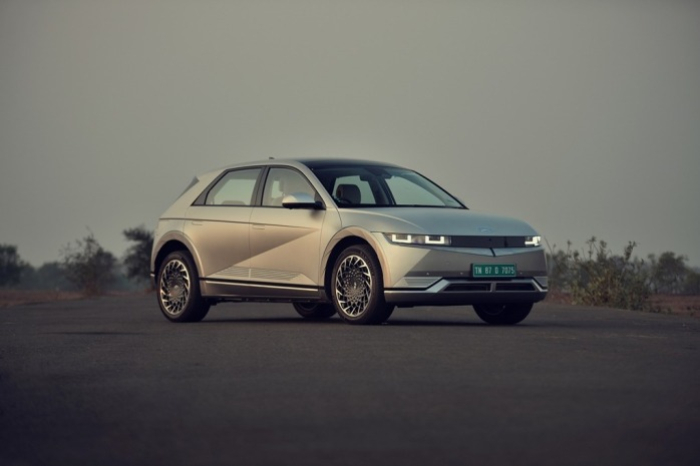
As India is also among the fastest-growing EV markets in Asia, the Korean carmaker in May last year announced a plan to invest about 200 billion rupees ($2.5 billion) to build EV production facilities and infrastructure in India for 10 years from 2023.
It also plans to roll out six EV models in the South Asian country by 2028 and set up EV charging stations across the nation, using local car dealers.
Especially, through its Indian subsidiary, Hyundai Motor India Ltd., Hyundai Motor plans to set up a battery pack assembly plant in Chennai, dubbed the Detroit of Asia, and install 100 EV charging stations in the southern state in five years.
Its sibling Kia also plans to start producing small EV models tailored to the needs of Indian drivers in 2025 and releasing diverse electric vehicles, including purpose-built vehicles (PBV) in phases.
They have already rolled out their existing EV models, including the IONIQ 5, the Kona Electric and the EV6 in the Indian market.
Their partnership with Exide is also expected to help the Korean auto-making duo diversify their battery supply chain and stabilize battery supply at a time of increasing geopolitical risk.
Hyundai Motor and Kia aim to bump up their combined sales in India by 4.2% this year after logging record vehicle output in India last year for the third straight year.
It plans to invest a total of 5.2 trillion won ($3.8 billion) in the world’s most populous country, which has emerged as its key growth market replacing China and Russia, by 2032 to further widen the gap with its followers.
To fund its expansion in the country, Hyundai Motor’s Indian subsidy is mulling its initial public offering in the country.
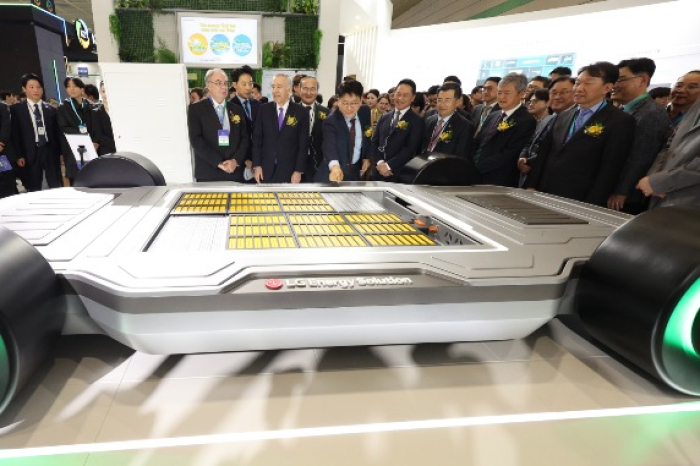
Hyundai Motor Group’s India-made LFP battery adoption, however, is expected to bode ill for Korean battery makers, which have jointly advanced into other overseas markets with Hyundai Motor and Kia.
The industry has projected that Hyundai Motor would team up with LG Energy Solution Ltd. to foray into the Indian EV market after they successfully collaborated to enter other Asian EV markets, including Indonesia.
Due to the Hyundai-Exide LFP partnership, however, it is less likely that LG Energy Solution’s batteries would be used in the Korean carmakers' new cars developed for the Indian market, industry observers said.
LG Energy Solution last year set up a sales office in India in hopes of expanding its presence in the country. But its plan to fast advance into the market has hit a snag in the absence of LFP batteries.
Write to Nan-Sae Bin at binthere@hankyung.com
Sookyung Seo edited this article.
More To Read
-
Feb 22, 2024 (Gmt+09:00)
-
Jan 15, 2024 (Gmt+09:00)
-
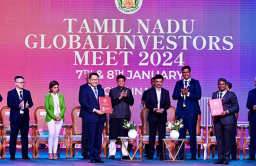 Electric vehiclesHyundai to invest an additional $744 mn in Indian hydrogen biz
Electric vehiclesHyundai to invest an additional $744 mn in Indian hydrogen bizJan 08, 2024 (Gmt+09:00)
-
Dec 24, 2023 (Gmt+09:00)


